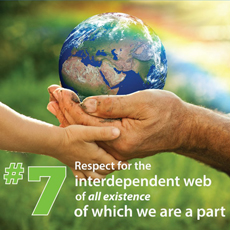The Unitarian Universalist Association, of which we are a member congregation, recommends that congregations plan for virtual operations through May 2021.
While there is much public conversation about “reopening,” the reality is public health officials consistently predict a long trajectory for this pandemic. Religious gatherings are considered highly contagious events. The acts of singing, the familiarity of people across households, the multigenerational community of children, youth, adults and seniors—the things that make our congregations so special—also create more risk for spreading the virus.
In making our recommendations, we are guided by science and our deepest held values. This pandemic teaches us that our actions directly impact the health and well-being of our neighbors and so it is imperative that we make choices that keep our congregations and larger community safer.
Our decision is grounded in Unitarian Universalism’s deep values:
- Our abiding care and concern for the most vulnerable, inside and outside our congregation.
- Accessibility and inclusion for all of our members and friends to participate in our congregation, regardless of health status, health vulnerability, or ability.
- Recognition that we are part of an interdependent web and, as such, our risk-taking and our protective actions affect far more than just ourselves.
- Ethical treatment and expectations for our leaders and staff, minimizing the risks to their own health and well-being.
- Our affirmation that good science, coupled with our UU values, must be the basis upon which we make decisions about in-person gathering.
- Commitment to our mission, community, and theology more than ever, mindful of the spiritual demands of this transition.
- Our deep hope that we as a country, and as a world, will not return to “normal” when the pandemic is over. We seek to live into “a new normal” of more justice, more love, more equity, more sustainability, and more peace.
As COVID-19 disproportionately impacts people with disabilities, Black people, Indigenous communities, Latinx people, the elderly, and essential workers, a majority of whom are women and women of color, religious communities have a moral responsibility to do all we can to reduce risks for those already at such high risk.
We hope that a vaccine or an effective treatment will be found soon to change this timeline. In the meantime, being able to plan the longer horizon of virtual services offers an opportunity to be creative in planning for life-giving, essential ministry across physical distance.
Our detailed UUA Guidelines on Gathering In Person as COVID-19 Subsides include specific questions for congregations to ask to determine risk assessment and readiness plans before beginning any moves to gather in person. We will continue to update them as more information becomes available.

